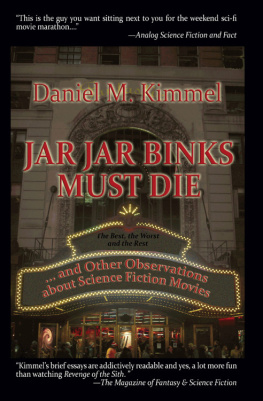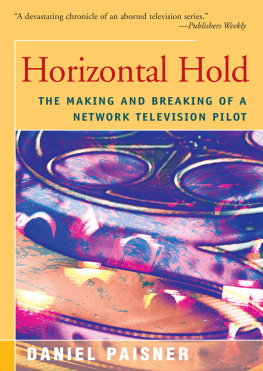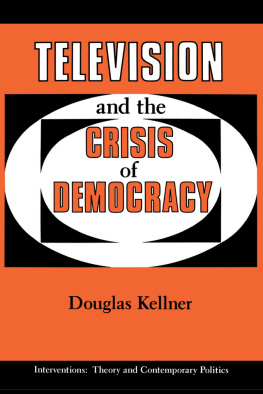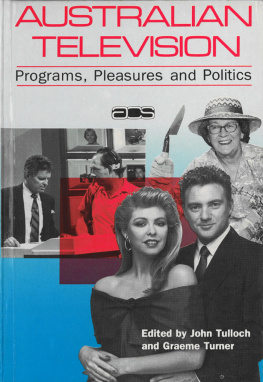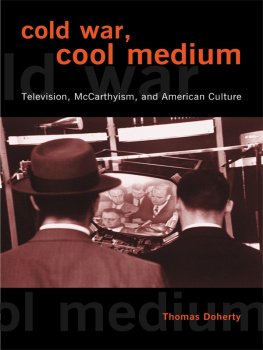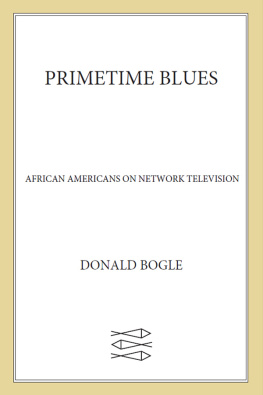A NOTE ON THE AUTHOR
Daniel M. Kimmel is the Boston correspondent for Variety and has written for numerous publications, including the Boston Globe, the Christian Science Monitor, Film Comment, and the Worcester (Massachusetts) Telegram and Gazette, where he reviews films. He also writes a column on classic science fiction films for Artemis magazine. In the 1990s he covered television first for his own syndicated column and then for the Boston Herald. Born in Long Island City, New York, he studied at the University of Rochester and received a law degree from Boston University. Mr. Kimmel has taught film and media-related courses at Emerson College, Boston University, and Suffolk University. He is co-author of the play The Waldorf Conference, about the birth of the Hollywood blacklist, and of Love Stories, a book of essays about Hollywoods most romantic movies. He lives in Brookline, Massachusetts, with his wife and daughter.
Acknowledgments
THERE ARE MANY PEOPLE to thank for making this book possible, but for reasons explained below, its important to mention one source that was closed to me, that of the FOX network and its current employees. The network was under no obligation to cooperate with this book, and I went into this project assuming such assistance would not be forthcoming. While it would have been useful to have the access that Alex Ben Block enjoyed for his 1990 history Outfoxed, I understood that since the network was looking for credibility at that time, its needs and the authors needs nicely dovetailed. Since FOX is part of a publicly traded company as well as being part of a licensed and regulated business, I did not need their permission or cooperation to access information on them and to proceed on my own. Whats more, FOX has shed many executives in its short history, and I was lucky to benefit from the perspective of many of them.
The reason for noting this lack of cooperation is the official reason that FOX gave me for refusal to participate in this project. In June 1999 I began contacting the producers of some of FOXs most important shows seeking interviews. One or more of them passed the request on to the network. When I received a call from a senior publicity executive there, I explained what I was doing, that I had no ax to grind, and that my goal was to write a balanced and objective history of FOX. I was promised tentative cooperation pending approval from higher-ups. That go-ahead never came. Instead I was told that since News Corp. owned its own publishing division, they might choose to do their own history of the FOX network someday, so they saw no reason to help with a potentially competing product.
The notion that FOX would consent to interviews only with an author working on an in-house book should be troubling not only to journalists but to anyone who treasures the free flow of information. While its possible that the current FOX administration may have simply decided on purely pragmatic terms to decline to provide assistance for this book, fear of competition was the only explanation the network offered, and it remains a disturbing one. Given that one of the big stories at the start of the twenty-first century is that control of the media is falling into fewer and fewer hands, lets hope this isnt a sign of things to come.
O n a more positive note, I want to thank the many individuals who took the time to talk with me about their experiences at or with FOX. In some cases people were exceptionally generous, clearing a large piece of their schedule for an extended interview. In other cases I was catching them on the fly, often pursuing them for months for the Q&A time I got. In the end, though, it was the interview that counted, not the effort that went into getting it. For their generosity I thank Tom Allen, Garth Ancier, Ed Ansin, Bob Bennett, Jim Benson, Tom Bergeron, Stephen J. Cannell, Michael H. Diamond, Andrew Fessel, Eric Gold, Bob Greenblatt, Lance Heflin, Doug Herzog, David Honig, Ken Johnson, Jamie Kellner, Rob Kenneally, Bob Leider, Phil Lerman, Margaret Loesch, Brian Lowry, the late Bob Mariano, Greg Meidel, Brad Moran, Patrick Mullen, Kevin OBrien, Preston Padden, James Quello, Peter Roth, Mike Ruggiero, Lucie Salhany, Andrew Jay Schwartzman, Andi Sporkin, Paul Stupin, Anne Sweeney, Gerry Walsh, Kevin Wendle, Larry Wilmore, David Woods, Joe Young, and Ken Ziffren.
For assistance in numerous ways, from providing leads to arranging interviews to simply pointing me in the right direction, I thank Michael L. Carson, S. James Coppersmith, Ro Dooley, Jack Fitzgerald, Charlie Folds, Tim Gray, Kim Harbin, Brandy Hauman, Robin Jackson at the Federal Communications Commission, Mark J. Kern, Gayle Kirschenbaum, Paul La Camera, Roger Lyons, Sabrie L. Napier and the staff at the National Association of Broadcasters library, Laurie Shroyer, Stu Tauber, John Vitanovec, and Dina Weinberg.
Several people must be singled out for special thanks. The late television consultant Paul McCarthy was a source and interview subject for his small piece of the FOX story, convincing the new affiliates of the importance of being included on area cable television systems. But without trying to influence what I was writing, McCarthy also provided me with numerous sources as well as some useful reference material. Some of the people he directed me to were smaller players in the overall chronicle but turned out to have very important stories to tell, and I remain grateful for McCarthys always enthusiastic advice.
Someday a doctoral student will do his or her thesis on the importance of the friends couch to the writing of American nonfiction. Nat Segaloff and Lisa and Robert Ashton opened up their homes to me for stays of a week or more, providing not only shelter but food and transportation. This is friendship above and beyond the call of duty. Even more astonishing was that members of their households with whom I had no prior acquaintance, Ami Lachmani, and Roger Bennett respectively, were equally generous in acceding to this home invasion. I hope this book makes them feel the effort was worth it.
Authors routinely thank their agents, and I shall be no exception. But I want to single out my agent, Alison Picard, for doing something that has become quite extraordinary in todays publishing industry: she took a chance on an unknown. One possible scenario for the five-hundred channel universe mentioned in my concluding chapter is already playing itself out in the world of publishing, where only books by celebrities or ones that are otherwise presold seem to have the best chance of reaching readers. Alison believed I had a story worth publishing, even though I had never had an affair with a politician or committed a major crime. She sets a standard the rest of the industry would be wise to emulate.
Likewise, Im pleased to have found a home at Ivan R. Dee. Ivans support and suggestions were welcome, and this book has benefited from both.
I also want to thank James Robert Parish, about whom it can honestly be said that but for him this book never would have been written. His contributions were invaluable. Allan Taylors input was equally useful. My unending gratitude is also extended to my attorney, Robert Abramoff of Burgee and Abramoff, who was always there when I needed him.
On the home front, my wife Donna and my daughter Amanda were a great support. Amanda so liked the idea of her daddy doing a book that she promised me someday to write a book and mention my name if I mentioned hers. So consider this a down payment. Also special thanks to friends and godparents Bill Jarosz and Denise Karlin for looking after Amanda when Daddy needed a little more time at the computer, and especially to Bill for helping Daddy get his new computer. This was essential when a national retail chain refused to replace it when it crashed ten days after purchase because I had thrown away the carton it came in. Bill, a senior executive for a major investment firm who oversees all their computer operations, diplomatically handled the retail negotiations to get the computer fixed at a time when diplomacy was the last thing on my mind. Fortunately the system was under warranty and was repaired within a week, but I do not recommend this way of starting a writing project.


